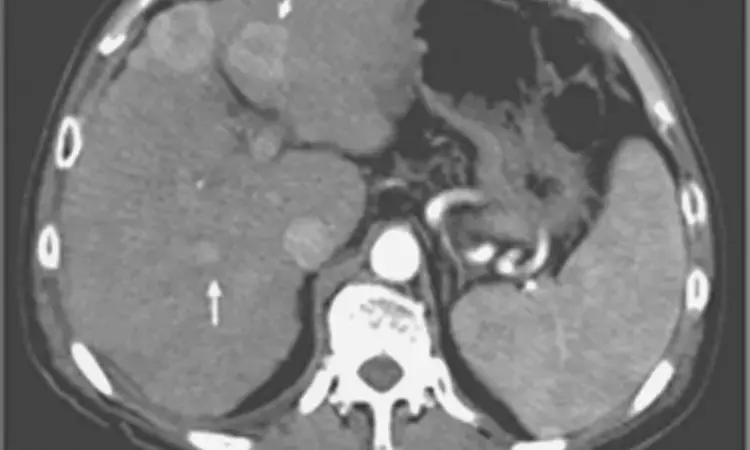- Home
- Medical news & Guidelines
- Anesthesiology
- Cardiology and CTVS
- Critical Care
- Dentistry
- Dermatology
- Diabetes and Endocrinology
- ENT
- Gastroenterology
- Medicine
- Nephrology
- Neurology
- Obstretics-Gynaecology
- Oncology
- Ophthalmology
- Orthopaedics
- Pediatrics-Neonatology
- Psychiatry
- Pulmonology
- Radiology
- Surgery
- Urology
- Laboratory Medicine
- Diet
- Nursing
- Paramedical
- Physiotherapy
- Health news
- Fact Check
- Bone Health Fact Check
- Brain Health Fact Check
- Cancer Related Fact Check
- Child Care Fact Check
- Dental and oral health fact check
- Diabetes and metabolic health fact check
- Diet and Nutrition Fact Check
- Eye and ENT Care Fact Check
- Fitness fact check
- Gut health fact check
- Heart health fact check
- Kidney health fact check
- Medical education fact check
- Men's health fact check
- Respiratory fact check
- Skin and hair care fact check
- Vaccine and Immunization fact check
- Women's health fact check
- AYUSH
- State News
- Andaman and Nicobar Islands
- Andhra Pradesh
- Arunachal Pradesh
- Assam
- Bihar
- Chandigarh
- Chattisgarh
- Dadra and Nagar Haveli
- Daman and Diu
- Delhi
- Goa
- Gujarat
- Haryana
- Himachal Pradesh
- Jammu & Kashmir
- Jharkhand
- Karnataka
- Kerala
- Ladakh
- Lakshadweep
- Madhya Pradesh
- Maharashtra
- Manipur
- Meghalaya
- Mizoram
- Nagaland
- Odisha
- Puducherry
- Punjab
- Rajasthan
- Sikkim
- Tamil Nadu
- Telangana
- Tripura
- Uttar Pradesh
- Uttrakhand
- West Bengal
- Medical Education
- Industry
PSMA-PET similar to MRI, superior to CT for liver cancer diagnosis: Study

Australia: PSMA (prostate-specific membrane antigen) PET/CT is equivalent to MRI and superior to computed tomography (CT) for the diagnosis of hepatocellular carcinoma (HCC) in patients undergoing surveillance imaging, a recent exploratory study has revealed.
"PSMA PET/CT can serve as a confirmatory test when findings from conventional imaging are equivocal, allowing for earlier diagnosis and improved management of liver cancer," the researchers wrote in their study published in the MDPI journal Tomography.
Hepatocellular carcinoma is the most frequently occurring primary liver malignancy, the third leading cause of cancer death, with an overall increasing incidence and 18% 5-year survival. Earlier diagnosis of recurrent or new HCC in at-risk patients improves long-term disease-free survival and provides the best opportunity for effective treatment.
Prostate-specific membrane antigen is expressed by approximately 90% of HCC in small case series and in-vitro studies. PSMA PET/CT has the potential as an imaging agent for detecting hepatocellular carcinoma, including early diagnosis and monitoring for recurrence following surgical resection. Considering this, Veronica Chi Ken Wong from The University of Sydney in Sydney, Australia, and colleagues aimed to compare PSMA PET to standard surveillance imaging in HCC detection.
For this purpose, the researchers prospectively recruited patients with suspected or treated hepatocellular carcinoma from a tertiary hospital outpatient clinic. A PSMA PET/CT was performed in addition to routine surveillance imaging as recommended by the multidisciplinary team. Clinical and imaging characteristics were compared over a follow-up period of up to 12 months.
Key findings of the study include:
- In a cohort of 19 patients with known HCC or suspected recurrent HCC, the efficacy of PSMA PET/CT was similar to MRI for the detection of hepatocellular carcinoma, with a sensitivity of 91% and a specificity of 70% and a sensitivity of 87% and a specificity of 73% for PSMA PET/CT and MRI, respectively.
- PSMA PET/CT had a higher negative predictive value of 90%.
To conclude, PSMA is shown to have promising equivalence in performance in the relatively sizeable single-centre study, and its role should be further evaluated in multi-centre prospective trials. The study showed PSMA PET/CT to be just as sensitive as MRI in detecting HCC and superior to CT.
"Future studies are underway, including phase 2 studies that will examine the utility of PSMA PET/MRI as a combined imaging modality and may continue to shed more light on the use of PSMA PET for HCC detection," the researchers wrote in their study. "PSMA-positivity may provide options for theranostic approaches using molecular markers linked with radionuclide therapies."
Reference:
Wong, V.C.K.; Yip, J.; Fragomeli, V.; Weltman, M.; Loh, H.; Le, K.; Nguyen, D.; Bui, C.; Mansberg, R. Comparison between PSMA PET/CT and MRI for Characterizing Hepatocellular carcinoma: A Real-World Study. Tomography 2023, 9, 130-138. https://doi.org/10.3390/tomography9010011
Dr Kamal Kant Kohli-MBBS, DTCD- a chest specialist with more than 30 years of practice and a flair for writing clinical articles, Dr Kamal Kant Kohli joined Medical Dialogues as a Chief Editor of Medical News. Besides writing articles, as an editor, he proofreads and verifies all the medical content published on Medical Dialogues including those coming from journals, studies,medical conferences,guidelines etc. Email: drkohli@medicaldialogues.in. Contact no. 011-43720751


